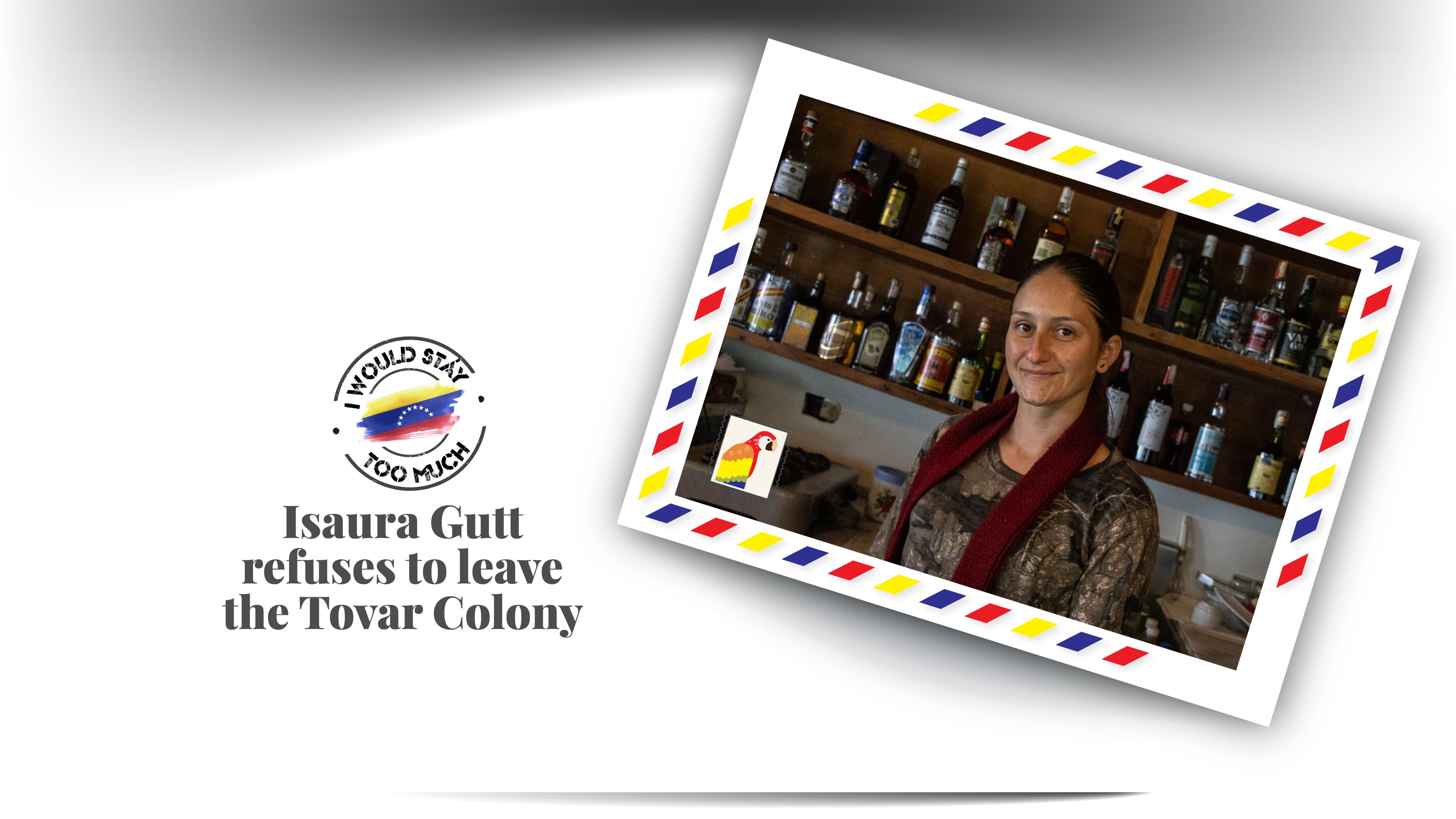
Many inhabitants in the Colonia Tovar (as it is known in Spanish) have left, looking for new opportunities. But Isaura Gutt does not leave the town. She is a descendant of one of the founders and keeps betting on this German colony in Venezuela
By Daniel Benítez

Isaura Gutt, 27-years-old, is behind the bar in La Ballesta, a recreational center in the highland of the Colonia Tovar. She is ordering some bottles and wipes the inside of the bar to start her workday. The place looks like a beer museum. Isaura is not wearing the typical German clothes as the other women who work in the town. She is wearing jeans, a t-shirt, tennis, and a scarf.
She insists on improving tourism in the Colonia Tovar despite the long lines in the gas station, the decrease in tourist visits, the impossibility that some colonieros have to take care of their health, or two of their childhood friends emigrated. Isaura, every weekend, attends La Ballesta.
"Many things have happened, but live abroad, to leave Venezuela has never crossed my mind. I keep betting on the Colonia. It is like a little piece of Germany here. It is a quiet and safe place. We have crops and artistic and cultural history to preserve."
As she says it, she stares at the green mountains and the enormous alpine-style houses originating from Schwarzuwal –in the Black Forest, southern Germany, where the founders of this town come from–, painted white or brown, crossed with black stripes, red roofs and full of flowers.
A 49-years-old merchant says because of the situation in the country, many colonieros have decided to migrate. The man is part of the fourth generation of Venezuelan descendants of German immigrants.
The man who preferred not to give his name added: "Some young people have gone to other latitudes searching for better opportunities. Here are some families where the parents were left alone. It seems that we are on our way to being a northern German town with only older adults."
Isaura, instead, refuses to let die the place where she was born and where they made the first beer in Venezuela. A place that also won a Guinness Record in 1993 when the largest sausage in the world was manufactured, weighing 498.6 kilos and 15 meters long.
German colonization
Isaura is a descendant of Carlos Gerig, one of the first German immigrants who arrived in the Colonia Tovar in the XIX century.
After the wars of Independence, the countries of South America faced a new scenario: they conquered freedom but with ruined lands. They needed arms to work. People thought of a novel form of colonization: re-population with German volunteers. The Venezuelan side got the support of Count Martín de Tovar y Ponte, who gave his lands in the Venezuelan Coastal Mountain Range north of La Victoria, where the German colony was established.
The group of Germans embarked at the French port of Le Havre in January 1843 and arrived at the Choroni coast in April 1843. In the travel came 80 German families from Kaiserstuhl, located in the southwest corner of the mountainous area in Germany. They were promised geography and climate similar to those in their town," a 50-year-old craftsman says. He is a direct descendant of Germans, who also asked to protect his identity.
The first immigrants brought all types of seeds and the technique to produce beer. They grew coffee and cultivated peaches, strawberries, and beets. They introduced techniques to make curious and showy candles and work the clay, turning the clay into vases, tableware, glasses, beer mugs, wine glasses, and all kinds of utensils for the home. Visitors admired his art and bought in droves. The fame of its ceramics is international.
"Four months after arriving in Venezuela, they made the first beer in Venezuela. German immigrants brought hops, barley. In the house in front of the church, in the basement, they made the first beer," the craftsman says.
She refuses to leave
Isaura hopes that her son will grow up and work in Venezuela. Despite all the circumstances, she believes it is a quiet and kind place to live. "I dream of Venezuela in the same way when I was a child. That time when we maintained good tourism. I see Venezuela improving and growing."
That is why, since her own space, she insists, so tourists can have a pleasant time. The recreational center La Ballesta, where Isaura works, promotes tourism as a resistance to the crisis.
"Here, we serve between 50 and 100 people every weekend. We are a demonstration that we can still do things like this in the Colonia Tovar."
The craftsman is also tied to the land because of its weather and the warmth of its people. "Venezuelans are friendly people. Making friends in Germany is very difficult. I went to study in Germany, but my heart and mind were here. It is so difficult to leave a country where you have your struggle, your effort, and your lifelong friends."
Thanks to those who share the same feeling as Isaura, the Colonia Tovar maintains its traditions: Carnival with the troupes of the famous 18th-century character Jokilis (a combination of Harlequins and buffoons), the Blessing of the Harvests; the Foundation party on April 8; the Oktoberfest, the patron saint festivities of all traveler Flower, Fruit and Handicraft Fair.
"Whoever walked in Colonia Tovar in the 80s and 90s fell in love, as I am. My heart is buried here," says the merchant.
The craftsman, the merchant, and other colonieros remain in the town because of the sentimental connection with the land. Also, for the peace, the good weather, the opportunities.
Isaura also remains for many reasons: "I am staying because Venezuela is the place that welcomed my ancestors. It is the place that has given me everything: my life, my son, my studies. I want to give something back to this land."
